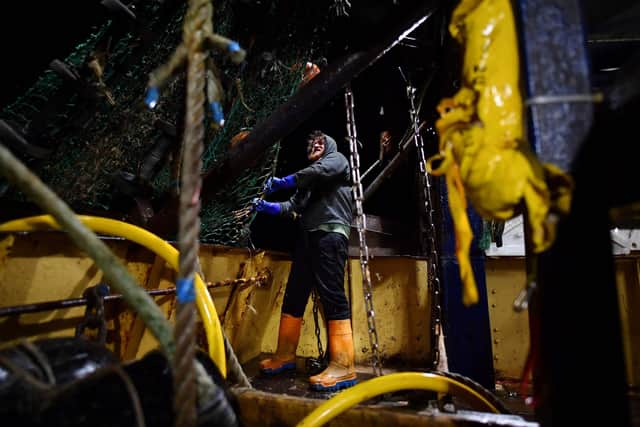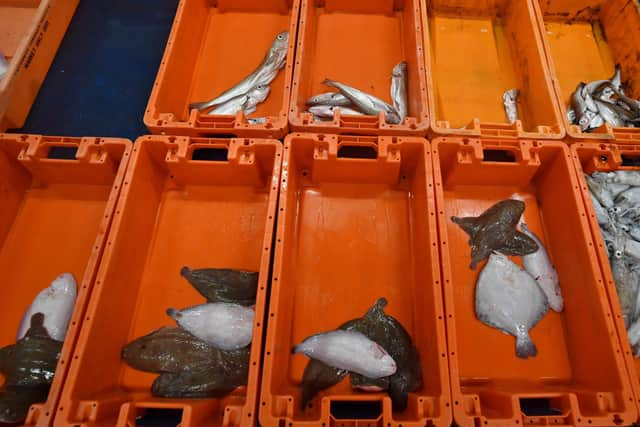The battle to deliver Brexit is over, the battle to justify it has just begun - Alexander Brown
So long, and thanks for all the fish, which we do need to renegotiate. And there’s the Northern Ireland protocol, which isn’t working, so the UK Government is having meetings on that.
Oh, and there’s no immediate sign of a US trade deal.
Into the second month of freedom, it’s clear getting Brexit done is like Sisyphus pushing a boulder up the hill – it’s always going to tumble back down.


Advertisement
Hide AdAdvertisement
Hide AdThe problem facing the UK Government is the impact of Brexit is already being felt. Nicola Sturgeon’s party point to a Warwick study claiming it has already cost Scotland £4 billion, while the Scottish Government’s own analysis projects it will cost £9bn.
There are also a host of issues created by the Prime Minister’s trade deal. On fishing, the Scottish seafood industry now finds itself dumping produce it can no longer sell due to delays.
Now banned from selling live shellfish exports to the EU, the UK Government continues to promise an “urgent resolution”. The issue remains unsolved and, with ministers blaming Brussels, a solution does not look forthcoming.


A compensation scheme has been announced, offering up to £100,000 for those suffering “genuine loss”, but when companies have lost millions, it is like offering a plaster to Monty Python's Black Knight after he's had all his limbs removed.
At a Scottish affairs committee session on fishing on earlier this month, James Withers, the chief executive of Scotland Food and Drink, explained: “We have ended up with a trading regime that has become complex, costly, slow, prone to breakdown at its best and, at worst, the door to the EU market has been closed altogether for some food exporters across Scotland.
“The industry asked, pleaded for a grace period. That plea really fell on deaf ears.”
The SNP have called for a grace period on Brexit checks on trade, much like the UK Government has requested for trade with Northern Ireland.
The trading issue is not just one affecting Scotland, but all of the UK. Britain’s borders have seen queues of lorries as the EU-UK Trade and Co-operation Agreement (TCA) increased trade barriers, despite the PM promising the opposite.
Advertisement
Hide AdAdvertisement
Hide AdGoods now traded between the two only avoid tariffs and quotas when they originate from the side exporting them under the rules of origin. This means goods imported from China to the UK would be hit with tariffs if sold on to the EU.
By leaving the customs union, the TCA also means goods are now subject to customs checks and new regulations, which are simply slowing down business and costing companies money.
These issues were expected, if denied by the UK Government. While there is no quick fix, pressure will grow for further tweaks to the arrangement, with solutions such as easing the rules of origin.
Last week the UK Government announced a £20m Brexit support fund for small businesses, defending the deal as the "biggest" the EU has ever negotiated.
Then there are the post-Brexit trading arrangements in Northern Ireland, something even Michael Gove has agreed are "not working".
The Cabinet Office minister has admitted "disruptions and difficulties" are hitting businesses, and confessed "we are very far away from resolving all those problems".
Mr Gove met with the European Commission vice-president Maros Sefcovic in London on Thursday to discuss the problems, but some in government still seem to be insisting everything is fine. Senior Cabinet Office official Jessica Glover told MPs last week that trade flows between are "back to normal".
Under the Northern Ireland protocol, the country follows the EU's rules on goods, something not extended to Scotland. The SNP have repeatedly argued against this and continue to use it as an example of different parts of the UK getting better treatment.
Advertisement
Hide AdAdvertisement
Hide AdAnother issue is that of Erasmus, the student exchange programme closed off to Britain due to Brexit, which will now be replaced by the Turing scheme.
The Turing scheme will be launched in the UK and will cover much of the opportunities offered by Erasmus, but both Scotland and Wales’s governments have claimed it is a “lesser imitation of the real thing”.
This week European Commission president Ursula Von der Leyen issued a blow to Scottish hopes to rejoin the Erasmus exchange scheme by saying it was "not possible" for Scotland to rejoin as it was part of the UK.
With the Irish Government funding the scheme to enable Northern Irish students to participate, other devolved administrations will continue to argue for access.
Then there are all the new powers in the UK Internal Market Bill.
The UK Government insists it will allow Westminster to directly fund Scottish businesses and boost infrastructure by reclaiming powers from Brussels. The SNP have brandished this a “power grab”, and raised concerns over what it will mean for the NHS, food standards and workers rights.
Brexit has given the UK Government more powers domestically, but the perception of how they use them will be a key battle in the months ahead.
It has presented benefits. While the UK approved vaccines while still a member, despite claims otherwise from UK Government ministers, leaving has allowed the UK to procure vaccines quicker, end the tax on tampons, and look at addressing standards for live animal exports.
Advertisement
Hide AdAdvertisement
Hide AdBrexit is done, but adapting to the new rules is going to take time, and opposition to the policies now pursued by the Conservatives means Scotland may not be willing to give it to them.
If you haven't already, please consider supporting our trusted, fact-checked journalism by taking out a digital subscription.
Comments
Want to join the conversation? Please or to comment on this article.